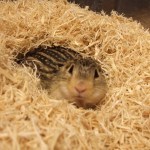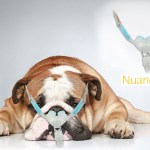sleep
By Shanghai killer whale (Own work) [CC BY-SA 3.0 (http://creativecommons.org/licenses/by-sa/3.0)], via Wikimedia Commons
I just read an interesting blog from the I Spy Physiology website sponsored by the American Physiological Society which described results from a recent study suggesting that chronic fatigue syndrome (CFS) might be a human equivalent to hibernation.
Chronic fatigue syndrome reportedly affects over 2.5 million people in the United States alone. People with this condition have the type of fatigue that does not seem to improve, even with adequate…
I was checking out the award-winning American Physiological Society's I Spy Physiology blog and came across a couple of really interesting posts about animals:
"If Only Birds Could Compete in the Summer Games"
Photo of a frigatebird in the study. Credit: Max Planck Institute.
This post reported a study of how frigatebirds manage to sleep during flights out at sea that can last for weeks. By measuring brain activity, the research team found that the birds were capable of actual sleep, during which time both sides of the brain showed sleep patterns for seconds at a time.…
I am very excited to report that the American Physiological Society in partnership with the The Physiological Society held a joint meeting from July 29-31 in Dublin, Ireland. The keynote lectures were given by Dr. Jerry Friedman from Rockefeller University and Dr. W Jon Lederer from the University of Maryland.
Dr. Friedman spoke about his research on obesity and how genetic factors might play a role. In fact, his team was responsible for discovering the obesity (ob) gene in mice in 1994 and identifying the similar gene in humans. The gene encodes the now iconic…
A special thank you to reader Dr. Barbara Goodman, Professor of Physiology at Sanford School of Medicine of the University of South Dakota who sent me a story from The Scientist about sleep in animals complete with footage of a dolphin that was seen apparently "sleeping" (video posted on YouTube):
Why do animals sleep? This is a question with many potential answers. It is known that birds and mammals experience slow-wave and rapid eye movement (REM) sleep patterns. During the first pattern, slow waves with high amplitudes can be seen if measuring electrical…
Scientists are finding that night shift work comes with a range of particular health risks, from heart disease to diabetes to breast cancer. This month, another study joined the pack — this one on the risk of traffic crashes among those who head home from work at sunrise.
To conduct the study, researchers from Brigham and Women's Hospital and the Liberty Mutual Research Institute recruited and examined the experiences of 16 night shift workers as they participated in two two-hour daytime drives on a closed test track. The study participants undertook one driving test after working a night…
Image from Wikimedia Commons
Researchers from La Trobe University and Max Planck Institute for Ornithology recorded young crocodiles and found that while the animals typically sleep with both eyes closed, in the morning hours they will sometimes open one eye periodically. If they placed another crocodile in the tank or stood nearby however, the animal would open one eye and look at the newcomer.
It was noted in the article that certain birds and aquatic mammals will likewise sleep with one eye open, with only half their brain staying awake. This is known as…
Congratulations to Mallory Ballinger, a graduate student from the University of Minnesota-Duluth, who is the 2015 recipient of the Dr. Dolittle Travel Award! The purpose of this award is to recognize an outstanding graduate student or postdoctoral fellow involved in comparative and evolutionary research and to provide assistance for them to attend the annual American Physiological Society Experimental Biology meeting. The application process includes the submission of a blog entry based on their research. She will be presenting her research at the upcoming Experimental Biology…
I came across an interesting study published last month in American Journal of Physiology - Regulatory, Integrative and Comparative Physiology on obstructive sleep apnea (OSA), which is a disorder in which the upper airway is repeatedly obstructed during sleep resulting in bouts of intermittent hypoxia (low oxygen concentrations). I had no idea that OSA is more common in postmenopausal as opposed to premenopausal women suggesting that estrogen may help protect from OSA. The sex hormones estrogen and testosterone can increase memory and spatial learning. Therefore a team of researchers from…
Feeling tired? You’re not alone. A new study finds that many U.S. workers aren’t getting enough sleep, which is essential to optimal health, and that people who work multiple jobs are at heightened risk of getting less than the recommended hours of nightly rest.
To conduct the study, which was published in the December issue of the Sleep journal, researchers examined the responses of nearly 125,000 Americans ages 15 years old and older and who participated in the American Time Use Survey between 2003 and 2011. They found that work was the dominant reason for reporting less sleep across nearly…
Another exciting day at the Experimental Biology meeting for physiologists! Although I am a bit nervous about the session on the negative effects of sleep deprivation, "Sleepless in San Diego: Is Sleep Deprivation the New Silent Killer?" Hmmm, maybe I should have gone to bed a bit earlier last night...
Dr. Karen Matthews (Univ of Pittsburgh) has studied the effects of sleep deprivation in teens from low-income families found that less than 6 hours of sleep per night can negatively impact mood, academic achievement and health.
Another talk that I found interesting was on how sleep deprivation…
National Sleep Awareness Week might have been last week, but many of us are feeling the importance of shuteye this week, as we struggle to drag ourselves out of bed at what feels like an inappropriate hour. While Daylight Saving Time may get the blame for sleepiness this week, though, there are important year-round factors that cause fatigue. In honor of National Sleep Awareness Week, the National Institute for Occupational Safety and Health's NIOSH Science Blog published two posts about the impact of work demands on sleep. Claire Caruso and Roger Rosa start off by highlighting the…
There's an article about a couple of recent cases charging people (read: mothers) with neglect if they (gasp!) dare to go to sleep around their children.
A couple of weeks ago in Delaware, a woman put her 3-year-old down for a nap and then took a nap herself. The 3-year-old got up and somehow escaped the house. After the girl was found, police charged her mother with child endangerment.
In New York, a woman's 3-year-old son got up in the middle of the night and wandered around. The woman woke up at some point and called the police. A man who had spotted the child had already called police.…
THE patterns of brain waves that occur during sleep can predict the likelihood that dreams will be successfully recalled upon waking up, according to a new study published in the Journal of Neuroscience. The research provides the first evidence of a 'signature' pattern of brain activity associated with dream recall. It also provides further insight into the brain mechanisms underlying dreaming, and into the relationship between our dreams and our memories.
Cristina Marzano of the Sleep Psychophysiology Laboratory at the University of Rome and her colleagues recruited 65 students,…
Personally, I hate setting the clocks back in winter. Since I basically wake up shortly after it gets light, I essentially lose an hour of sleep: going to bed an hour earlier really isn't an option--it's not like work shifts itself one hour earlier. And in Boston, the combination of being in the eastern part of the time zone, high latitude, and buidlings, means it gets dark around 4:30 pm and is pitch black by 5:30 pm. (Having said that, when I was in Gaithersburg, MD last week, it didn't really seem to get sunny--on a clear day--until around 8:15 am).
Apparently, I'm not the only one…
If you've ever done a long car trip with four kids - 10+ hours up and back, with multiple stops along the way, you know just how I feel.
The trip was wonderful - I got to talk about food and agriculture right in front of Thomas Jefferson's own vegetable garden, got to let my kids see enormously cool things they would otherwise have had no chance to view, and had a wonderful time visiting friends and family. We made some wonderful, wonderful new friends - including our hosts in Charlottesville who were insane enough to take in our whole family, sight unseen!
99% of the time, I take Amtrak…
Younger offspring: Mom? I have a question.
Dr. Free-Ride: OK.
Younger offspring: If I got up really early --
Dr. Free-Ride: I hope you won't.
Younger offspring: No, I won't, but if I got up really early, way before it's time to wake up, like, midnight, and I tried to open my eyes and wake up, would I not be able to because my nerves are tired?
Dr. Free-Ride: Hmmm.
Younger offspring: Because I think if I decided to wake up at midnight I wouldn't be able to. I won't be able to open my eyes or get out of bed.
Dr. Free-Ride: I think you might be right about that. If your body needs sleep, it…
In my final year of university, with exam deadlines looming and time increasingly fleeting, I considered recording some of my notes and playing them over while I was asleep. The concept of effectively gaining 6 extra hours of revision was appealing, but the idea didn't stick - it took too long to record the information and the noise stopped me from sleeping in the first place. And the whole thing had a vague hint of daftness about it. But a new experiment suggests that the idea actually has some merit, showing that you can indeed strengthen individual memories by reactivating them as you…
When we think of memory aids, we consider repeating what we've learned, using clever mnemonics, or breaking information down into bite-size chunks. But one of the best memory aids we have available to us is something we all do on a daily basis - sleep. Studies have found that sleep enhances our memories of facts and physical skills alike. It can even help us remember movements that we see others do.
But this only works within a short window. Ysbrand van der Werf from the Netherlands Institute of Neuroscience found that people who saw a video of someone tapping keys on a laptop remembered…
The German chemist Friedrich Kekule claimed to have intuited the chemical structure of the benzene ring after falling asleep in his chair and dreaming of an ouroboros (a serpent biting its own tail). He's certainly not the only person to have discovered a flash insight after waking from a good sleep. In science alone, many breakthroughs were apparently borne of a decent snooze, including Mendeleyev's creation of the Periodic Table and Loewi's experiments on the transmission of nervous signals through chemical messengers.
Most of us have tried sleeping on a difficult problem before and using…
I am not the only one on ScienceBlogs.com to write about circadian rhythms, sleep and (non-visual) photoreception. Over the years, my SciBlings have written about these and related topics as well. Here is a sampler - go and dig for more on their blogs.
Stimulant Improves Sleep
Locked-In Syndrome
Opioids and Sleep Disorders
Home Testing for Sleep Apnea?
Pure Hypomanics: Living Zippedy Doo Dah Lives?
SFN Update: Sleep Deprivation Impacts Memory, Reduces Hippocampal Activity
Data Faker Turns Himself In
Agomelatine: A New Approach For Depression
Casual Fridays: Dave FINALLY finishes analyzing the…


